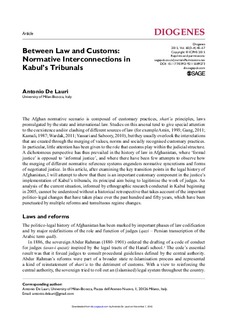Between Law and Customs: Normative Interconnections in Kabul’s Tribunals
Journal article, Peer reviewed
Permanent lenke
http://hdl.handle.net/11250/2475313Utgivelsesdato
2015-01-01Metadata
Vis full innførselSamlinger
- Publications [1488]
Sammendrag
The Afghan normative scenario is composed of customary practices, shari’a principles, laws promulgated by the state and international law. Studies on this arsenal tend to give special attention to the coexistence and/or clashing of different sources of law (for exemple Amin, 1993; Gang, 2011; Kamali, 1987; Wardak, 2011; Yassari and Saboory, 2010), but they usually overlook the interrelations that are created through the merging of values, norms and socially recognised customary practices. In particular, little attention has been given to the role that customs play within the judicial structure. A dichotomous perspective has thus prevailed in the history of law in Afghanistan, where ‘formal justice’ is opposed to ‘informal justice’, and where there have been few attempts to observe how the merging of different normative reference systems engenders normative syncretisms and forms of negotiated justice. In this article, after examining the key transition points in the legal history of Afghanistan, I will attempt to show that there is an important customary component in the justice’s implementation of Kabul’s tribunals, its principal aim being to legitimise the work of judges. An analysis of the current situation, informed by ethnographic research conducted in Kabul beginning in 2005, cannot be understood without a historical retrospective that takes account of the important politico-legal changes that have taken place over the past hundred and fifty years, which have been punctuated by multiple reforms and tumultuous regime changes.
Serie
Diogenes vol. Vol. 60(3-4)Diogenes vol. Vol. 60(3-4) no. 3-4
